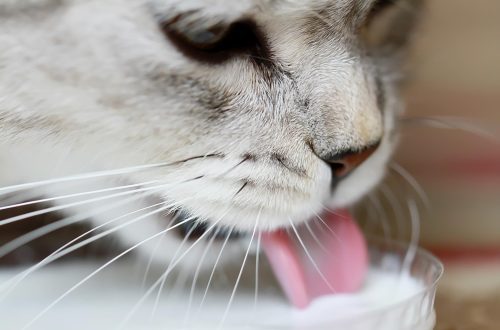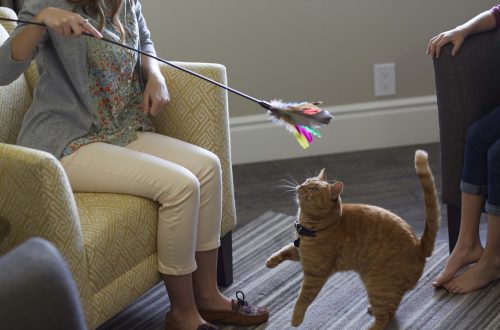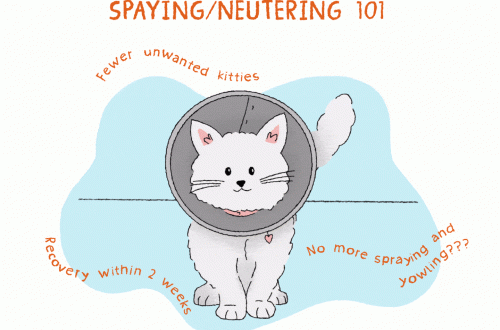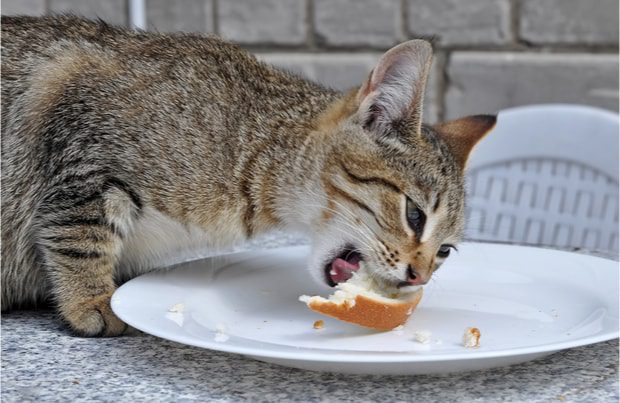
Is it possible to feed a cat with bread
Many pets will be happy with a piece of warm bread, but is it worth sharing this delicious treat with them? Before you give your pet a sandwich or a piece of a loaf, it is important to find out if it is harmful to pets. How things are in reality – in this article.
Contents
Can cats eat bread
As with many human foods, baked goods can be consumed in moderation by cats. That being said, cats shouldn’t be fed bread on a regular basis – it’s best to save it for use as a treat.
From a health point of view, baked goods do not contain anything terrible for a cat, but at the same time, they also lack the necessary nutrients. Bread for cats is considered a source of empty calories. A piece of white bread contains a fifth of the daily calorie intake of an average cat. If two slices of bread are hardly enough for the owner to eat, then for a cat this is too much.
Bread may come in handy if the cat has been prescribed medication to take by mouth. You can hide the pill in soft bread or even spray liquid medicine on it. But the cat may not fall for this trick. Many pets won’t eat medicated food because of the bitter taste, doctors at PennVet Ryan Veterinary Hospital at the University of Pennsylvania explain. They add that canned cat food can help in such cases. But if the cat likes to eat bread, you can use it. It is important not to forget that the cat can associate the bitterness of the drug with the food and may well refuse to eat at all, so sometimes veterinarians do not recommend mixing medicines and food at all.
Is bread bad for cats?
Some types of baked goods will be safer for cats than others. It is better to adopt the following rule of thumb: the simpler the composition of the bread, the less harm it will cause to the animal.
The World Small Animal Veterinary Association emphasizes that products that are safe for humans can be toxic to animals. Bread is no exception. If you add tomatoes, onions or garlic to bread, the loaf will become toxic food for the cat.
If the cat eats bread with pleasure, varieties with herbs and spices should be avoided, because it is not known for certain whether they are safe for cats. In any case, before giving a cat any human food, it is best to consult a veterinarian.
It is worth noting that we are talking about baked bread. It must be remembered that although the main types of baked bread are not dangerous foods for cats, bread dough containing active yeast poses a significant risk to their health.
Yeast and its impact on cat health
As Preventive Vet writes, “yeast found in even a small amount of raw bread or pizza dough can quickly produce enough alcohol and carbon dioxide to cause serious problems in a cat.” Raw dough – and this applies to any yeast dough, not just bread – can increase in volume, both on the kitchen table and inside the cat’s digestive system, causing the walls of the stomach to expand and severe bloating. In rare cases, surgery may even be required to remove the test mass.
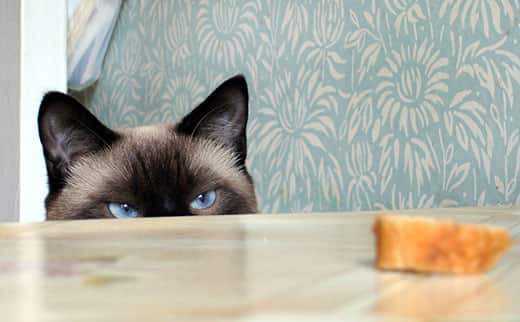
Feeding raw yeast to a cat can lead to poisoning. This condition is called alcoholic toxicosis. It occurs because “yeast fermentation releases ethanol, which is absorbed into the bloodstream, leading to intoxication and metabolic acidosis—excessive acid that changes blood chemistry,” according to the Merck Veterinary Manual. Alcohol is contraindicated in all animals due to the toxicity of ethanol, which can be fatal if swallowed.
Signs of yeast ingestion include vomiting, diarrhea, increased gas and bloating. If there is a suspicion that the cat has eaten raw dough containing yeast, you should immediately contact a veterinary clinic or emergency clinic.
How does bread affect cat nutrition?
Cats are obligate carnivores, which means they must get some of their nutrients from meat. Meat products must be present in the cat’s diet. Cats need food formulated with carefully selected ingredients that provide the right balance of nutrients, including animal protein, amino acids, vitamins, minerals and energy to keep them healthy.
Before giving a cat bread, it is necessary to think not only about her diet, but also about her state of health in general. If your pet has diabetes, you should definitely consult a specialist before giving her bread. “Your veterinarian may recommend feeding your cat a low-carbohydrate diet, as such diets have been shown to improve blood glucose control,” says Cornell University’s College of Veterinary Medicine.
In general, the amount of snacking your cat should have should be limited. Feeding unfamiliar foods can lead to stomach upset, even if the cat has no health problems. Bread should not become a permanent component of a cat’s diet. This delicious treat should be shared very infrequently and very sparingly.



